一 Fabric-X86
1.查看虚拟机环境
uname -a
显示X86架构 centos7发行版本

2.源码克隆
选定位置进行GitHub代码克隆,命令为
git clone https://github.com/hyperledger/fabric.git

克隆成功后生成文件夹fabric,源码克隆成功
在fabric目录切换版本至V2.2.5
cd fabric
git checkout v2.2.5
3.golang版本升级
根据要求部署fabric2.2.5版本,go的版本需要最低达到1.14.1版本
下载安装包
wget https://storage.googleapis.com/golang/go1.19.3.linux-amd64.tar.gz
解压至固定位置
tar -xvf go1.19.3.linux-amd64.tar.gz -C /usr/local/
配置环境变量
vi /etc/profile
末尾添加
export GOROOT=/usr/local/go
export GOPATH=/root/go
export PATH=$PATH:/usr/local/go/bin
刷新环境变量:
source /etc/profile
查看go版本信息
go version

4.拉取fabric镜像
进入 /fabric/scripts 目录
cd fabric/scripts/
修改 bootstrap.sh 脚本
vi bootstrap.sh
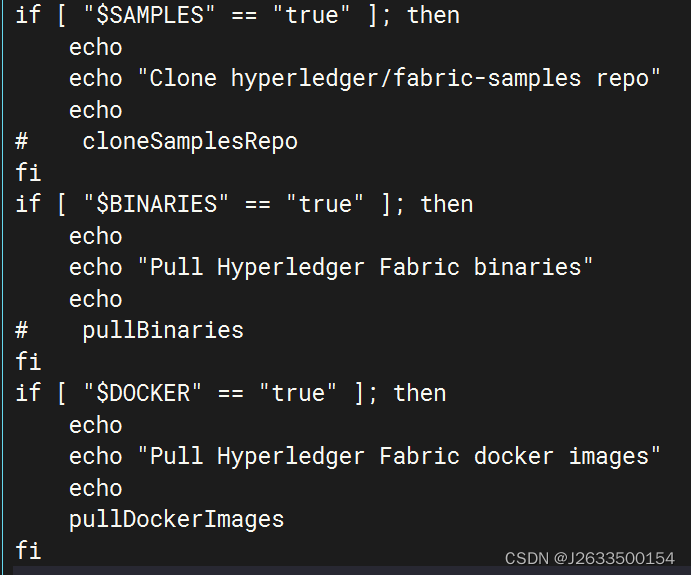
完整脚本:
#!/bin/bash
#
# Copyright IBM Corp. All Rights Reserved.
#
# SPDX-License-Identifier: Apache-2.0
#
# if version not passed in, default to latest released version
VERSION=2.2.5
# if ca version not passed in, default to latest released version
CA_VERSION=1.5.0
ARCH=$(echo "$(uname -s|tr '[:upper:]' '[:lower:]'|sed 's/mingw64_nt.*/windows/')-$(uname -m | sed 's/x86_64/amd64/g')")
MARCH=$(uname -m)
printHelp() {
echo "Usage: bootstrap.sh [version [ca_version]] [options]"
echo
echo "options:"
echo "-h : this help"
echo "-d : bypass docker image download"
echo "-s : bypass fabric-samples repo clone"
echo "-b : bypass download of platform-specific binaries"
echo
echo "e.g. bootstrap.sh 2.2.5 1.5.2 -s"
echo "will download docker images and binaries for Fabric v2.2.5 and Fabric CA v1.5.2"
}
# dockerPull() pulls docker images from fabric and chaincode repositories
# note, if a docker image doesn't exist for a requested release, it will simply
# be skipped, since this script doesn't terminate upon errors.
dockerPull() {
#three_digit_image_tag is passed in, e.g. "1.4.7"
three_digit_image_tag=$1
shift
#two_digit_image_tag is derived, e.g. "1.4", especially useful as a local tag for two digit references to most recent baseos, ccenv, javaenv, nodeenv patch releases
two_digit_image_tag=$(echo "$three_digit_image_tag" | cut -d'.' -f1,2)
while [[ $# -gt 0 ]]
do
image_name="$1"
echo "====> hyperledger/fabric-$image_name:$three_digit_image_tag"
docker pull "hyperledger/fabric-$image_name:$three_digit_image_tag"
docker tag "hyperledger/fabric-$image_name:$three_digit_image_tag" "hyperledger/fabric-$image_name"
docker tag "hyperledger/fabric-$image_name:$three_digit_image_tag" "hyperledger/fabric-$image_name:$two_digit_image_tag"
shift
done
}
cloneSamplesRepo() {
# clone (if needed) hyperledger/fabric-samples and checkout corresponding
# version to the binaries and docker images to be downloaded
if [ -d first-network ]; then
# if we are in the fabric-samples repo, checkout corresponding version
echo "===> Checking out v${VERSION} of hyperledger/fabric-samples"
git checkout v${VERSION}
elif [ -d fabric-samples ]; then
# if fabric-samples repo already cloned and in current directory,
# cd fabric-samples and checkout corresponding version
echo "===> Checking out v${VERSION} of hyperledger/fabric-samples"
cd fabric-samples && git checkout v${VERSION}
else
echo "===> Cloning hyperledger/fabric-samples repo and checkout v${VERSION}"
git clone -b master https://github.com/hyperledger/fabric-samples.git && cd fabric-samples && git checkout v${VERSION}
fi
}
# This will download the .tar.gz
download() {
local BINARY_FILE=$1
local URL=$2
echo "===> Downloading: " "${URL}"
curl -L --retry 5 --retry-delay 3 "${URL}" | tar xz || rc=$?
if [ -n "$rc" ]; then
echo "==> There was an error downloading the binary file."
return 22
else
echo "==> Done."
fi
}
pullBinaries() {
echo "===> Downloading version ${FABRIC_TAG} platform specific fabric binaries"
download "${BINARY_FILE}" "https://github.com/hyperledger/fabric/releases/download/v${VERSION}/${BINARY_FILE}"
if [ $? -eq 22 ]; then
echo
echo "------> ${FABRIC_TAG} platform specific fabric binary is not available to download <----"
echo
exit
fi
echo "===> Downloading version ${CA_TAG} platform specific fabric-ca-client binary"
download "${CA_BINARY_FILE}" "https://github.com/hyperledger/fabric-ca/releases/download/v${CA_VERSION}/${CA_BINARY_FILE}"
if [ $? -eq 22 ]; then
echo
echo "------> ${CA_TAG} fabric-ca-client binary is not available to download (Available from 1.1.0-rc1) <----"
echo
exit
fi
}
pullDockerImages() {
command -v docker >& /dev/null
NODOCKER=$?
if [ "${NODOCKER}" == 0 ]; then
FABRIC_IMAGES=(peer orderer ccenv tools)
case "$VERSION" in
1.*)
FABRIC_IMAGES+=(javaenv)
shift
;;
2.*)
FABRIC_IMAGES+=(nodeenv baseos javaenv)
shift
;;
esac
echo "FABRIC_IMAGES:" "${FABRIC_IMAGES[@]}"
echo "===> Pulling fabric Images"
dockerPull "${FABRIC_TAG}" "${FABRIC_IMAGES[@]}"
echo "===> Pulling fabric ca Image"
CA_IMAGE=(ca)
dockerPull "${CA_TAG}" "${CA_IMAGE[@]}"
echo "===> List out hyperledger docker images"
docker images | grep hyperledger
else
echo "========================================================="
echo "Docker not installed, bypassing download of Fabric images"
echo "========================================================="
fi
}
DOCKER=true
SAMPLES=true
BINARIES=true
# Parse commandline args pull out
# version and/or ca-version strings first
if [ -n "$1" ] && [ "${1:0:1}" != "-" ]; then
VERSION=$1;shift
if [ -n "$1" ] && [ "${1:0:1}" != "-" ]; then
CA_VERSION=$1;shift
if [ -n "$1" ] && [ "${1:0:1}" != "-" ]; then
THIRDPARTY_IMAGE_VERSION=$1;shift
fi
fi
fi
# prior to 1.2.0 architecture was determined by uname -m
if [[ $VERSION =~ ^1\.[0-1]\.* ]]; then
export FABRIC_TAG=${MARCH}-${VERSION}
export CA_TAG=${MARCH}-${CA_VERSION}
export THIRDPARTY_TAG=${MARCH}-${THIRDPARTY_IMAGE_VERSION}
else
# starting with 1.2.0, multi-arch images will be default
: "${CA_TAG:="$CA_VERSION"}"
: "${FABRIC_TAG:="$VERSION"}"
: "${THIRDPARTY_TAG:="$THIRDPARTY_IMAGE_VERSION"}"
fi
BINARY_FILE=hyperledger-fabric-${ARCH}-${VERSION}.tar.gz
CA_BINARY_FILE=hyperledger-fabric-ca-${ARCH}-${CA_VERSION}.tar.gz
# then parse opts
while getopts "h?dsb" opt; do
case "$opt" in
h|\?)
printHelp
exit 0
;;
d) DOCKER=false
;;
s) SAMPLES=false
;;
b) BINARIES=false
;;
esac
done
if [ "$SAMPLES" == "true" ]; then
echo
echo "Clone hyperledger/fabric-samples repo"
echo
# cloneSamplesRepo
fi
if [ "$BINARIES" == "true" ]; then
echo
echo "Pull Hyperledger Fabric binaries"
echo
# pullBinaries
fi
if [ "$DOCKER" == "true" ]; then
echo
echo "Pull Hyperledger Fabric docker images"
echo
pullDockerImages
fi
修改完毕后运行脚本拉取镜像
./bootstrap.sh
查看拉取的镜像
docker images
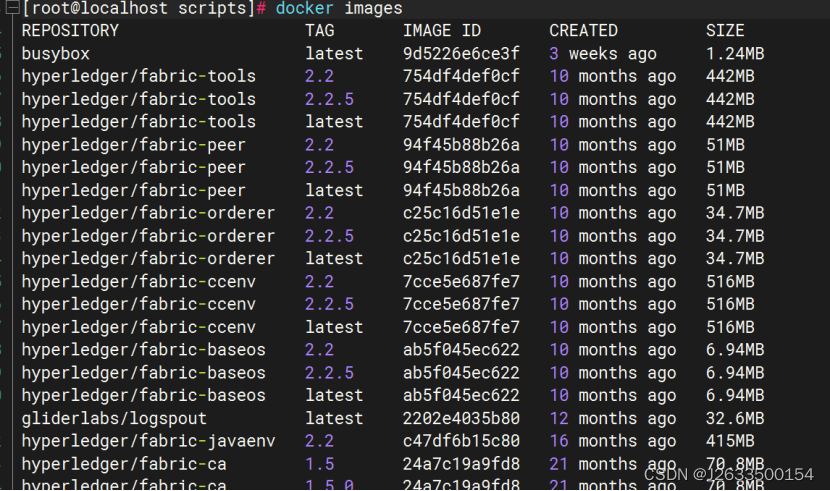
5.启动测试网络
将 bin 和 config 复制到 fabric-samples 目录下:
[root@localhost ~]# cp -r bin/ fabric-samples/
[root@localhost ~]# cp -r config/ fabric-samples/
将 fabric-samples 的 bin 加入路径PATH:
vi /etc/profile
export PATH=$PATH:$GOROOT/bin:$GOPATH/bin:/root/fabric-samples/bin
source /etc/profile
到test-network目录下运行启动脚本
./network.sh up
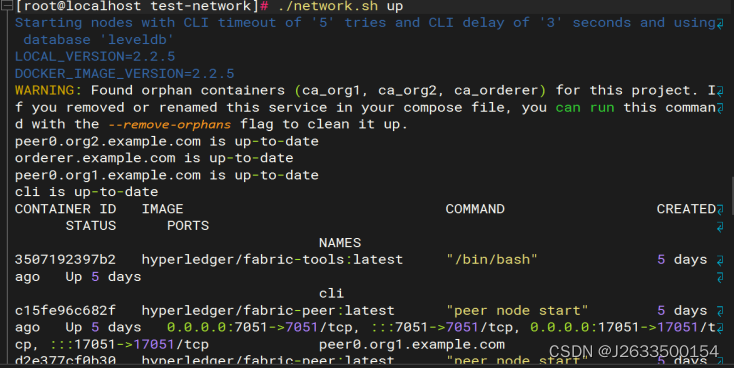
Fabric测试网络启动成功
关闭测试网络
./network.sh down
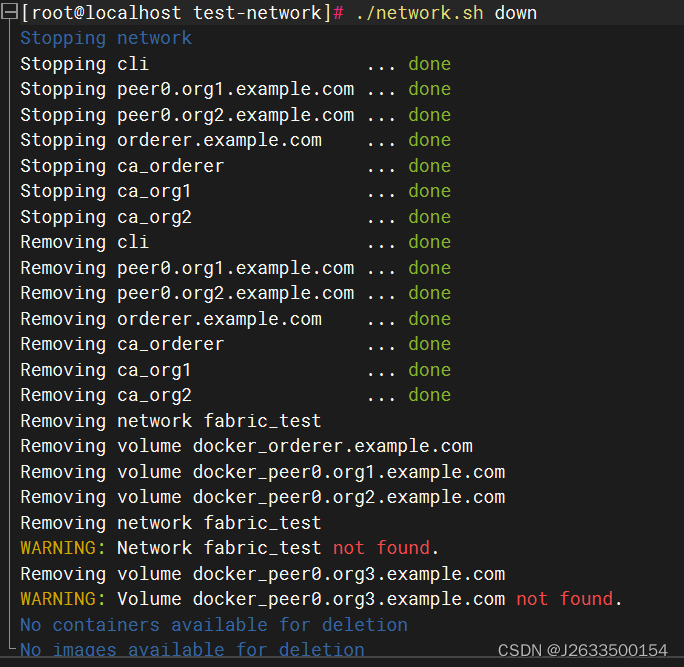
6.将智能合约部署到通道
创建通道
./network.sh up createChannel
该命令创建一个以两个通道成员 Org1 和 Org2 命名的通道

使用Java链码,打包智能合约
进入Java文件夹
cd fabric-samples/chaincode/fabcar/java
安装智能合约依赖项
./gradlew installDist

命令成功,能够在文件夹中找到构建的智能合约
使用 CLI 创建所需格式的链码包
cd ../../../test-network
二进制文件添加到 CLI 路径
export PATH=${PWD}/../bin:$PATH
export FABRIC_CFG_PATH=$PWD/../config/
检查二进制文件的版本
peer version
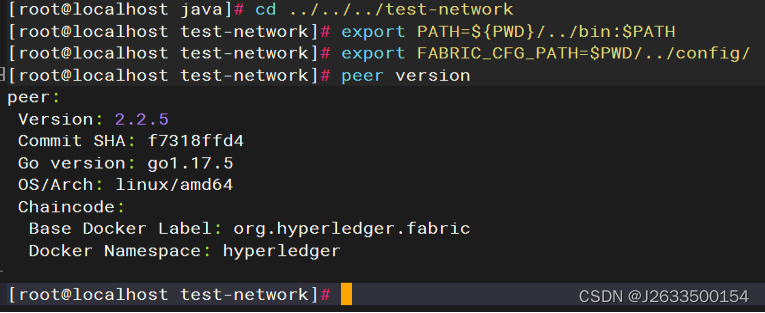
创建链码包
peer lifecycle chaincode package fabcar.tar.gz --path ../chaincode/fabcar/java/build/
install/fabcar --lang java --label fabcar_1
安装链码包
在 Org1 上安装链码,设置以下环境变量以 Org1 管理员用户身份操作 CLI
export CORE_PEER_TLS_ENABLED=true
export CORE_PEER_LOCALMSPID="Org1MSP"
export CORE_PEER_TLS_ROOTCERT_FILE=${PWD}/organizations/peerOrganizations/org1.example.com/peers/peer0.org1.example.com/tls/ca.crt
export CORE_PEER_MSPCONFIGPATH=${PWD}/organizations/peerOrganizations/org1.example.com/users/Admin@org1.example.com/msp
export CORE_PEER_ADDRESS=localhost:7051
在 Peer节点上安装链码
peer lifecycle chaincode install fabcar.tar.gz

在 Org2 上安装链码,以下环境变量设置以Org2为管理员和目标
export CORE_PEER_LOCALMSPID="Org2MSP"
export CORE_PEER_TLS_ROOTCERT_FILE=${PWD}/organizations/peerOrganizations/org2.example.com/peers/peer0.org2.example.com/tls/ca.crt
export CORE_PEER_TLS_ROOTCERT_FILE=${PWD}/organizations/peerOrganizations/org2.example.com/peers/peer0.org2.example.com/tls/ca.crt
export CORE_PEER_MSPCONFIGPATH=${PWD}/organizations/peerOrganizations/org2.example.com/users/Admin@org2.example.com/msp
export CORE_PEER_ADDRESS=localhost:9051
安装链码
peer lifecycle chaincode install fabcar.tar.gz

批准链码定义
peer lifecycle chaincode queryinstalled
返回包id,在下一步骤需要使用

使用包id,设置环境变量
export CC_PACKAGE_ID=fabcar_1:cf8172d318266bd1e58a4112c32340b14c1fbf4d787824c4f312dae9a701bc0d
分发给其他节点
peer lifecycle chaincode approveformyorg -o localhost:7050 --ordererTLSHostnameOverride orderer.example.com --channelID mychannel --name fabcar --version 1.0 --package-id $CC_PACKAGE_ID --sequence 1 --tls --cafile ${PWD}/organizations/ordererOrganizations/example.com/orderers/orderer.example.com/msp/tlscacerts/tlsca.example.com-cert.pem

设置以下环境变量以 Org1 管理员身份运行
export CORE_PEER_LOCALMSPID="Org1MSP"
export CORE_PEER_MSPCONFIGPATH=${PWD}/organizations/peerOrganizations/
org1.example.com/users/Admin@org1.example.com/msp
export CORE_PEER_TLS_ROOTCERT_FILE=${PWD}/organizations/
peerOrganizations/org1.example.com/peers/peer0.org1.example.com/tls/ca.crt
export CORE_PEER_ADDRESS=localhost:7051
批准链码定义为 Org1
peer lifecycle chaincode approveformyorg -o localhost:7050 --ordererTLSHostnameOverrideorderer.example.com --channelID mychannel --name fabcar --version 1.0 --package-id $CC_PACKAGE_ID --sequence 1 --tls --cafile ${PWD}/organizations/ordererOrganizations/example.com/orderers/orderer.example.com/msp/tlscacerts/tlsca.example.com-cert.pem

将链码定义提交到通道
peer lifecycle chaincode checkcommitreadiness--channelID mychannel --name fabcar --version 1.0 --sequence 1 --tls --cafile ${PWD}/organizations/ordererOrganizations/example.com/orderers/orderer.example.com/msp/tlscacerts/tlsca.example.com-cert.pem --output json

提交命令将链码定义提交到通道
peer lifecycle chaincode commit -o localhost:7050 --ordererTLSHostnameOverride orderer.example.com --channelID mychannel --name fabcar --version 1.0 --sequence 1 --tls --cafile${PWD}/organizations/ordererOrganizations/example.com/orderers/orderer.example.com/msp/tlscacerts/tlsca.example.com-cert.pem --peerAddresses localhost:7051 --tlsRootCertFiles ${PWD}/organizations/peerOrganizations/org1.example.com/peers/peer0.org1.example.com/tls/ca.crt --peerAddresses localhost:9051 --tlsRootCertFiles ${PWD}/organizations/peerOrganizations/org2.example.com/peers/peer0.org2.example.com/tls/ca.crt

通过查询提交命令来确认链码定义已提交到通道
peer lifecycle chaincode querycommitted --channelID mychannel --name fabcar --cafile ${PWD}/organizations/ordererOrganizations/example.com/orderers/orderer.example.com/msp/tlscacerts/tlsca.example.com-cert.pem
返回链码定义的序列和版本
调用链码
peer chaincode invoke -o localhost:7050 --ordererTLSHostnameOverride orderer.example.com --tls --cafile ${PWD}/organizations/ordererOrganizations/example.com/orderers/orderer.example.com/msp/tlscacerts/tlsca.example.com-cert.pem -C mychannel -n fabcar --peerAddresses localhost:7051 --tlsRootCertFiles ${PWD}/organizations/peerOrganizations/org1.example.com/peers/peer0.org1.example.com/tls/ca.crt --peerAddresses localhost:9051 --tlsRootCertFiles ${PWD}/organizations/peerOrganizations/org2.example.com/peers/peer0.org2.example.com/tls/ca.crt -c '{"function":"initLedger","Args":[]}'
[外链图片转存失败,源站可能有防盗链机制,建议将图片保存下来直接上传(img-DXe6sv7x-1670986981448)(在这里插入图片描述)]](https://img-blog.csdnimg.cn/04ee669221ec471a8e471babcb3a84ce.png)
使用查询函数来读取由链码创建的汽车集
peer chaincode query -C mychannel -n fabcar -c '{"Args":["queryAllCars"]}'
